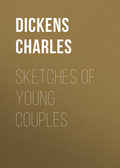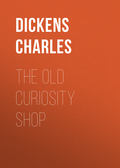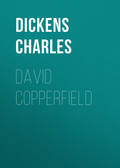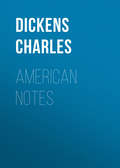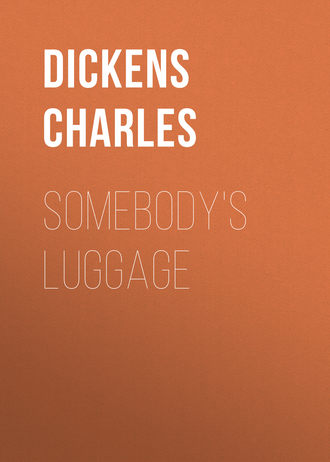
Чарльз Диккенс
Somebody's Luggage
“I little thought,” said the Englishman, after walking for several minutes, and more than once blowing his nose, “when I was looking round that cemetery – I’ll go there!”
Straight he went there, and when he came within the gate he paused, considering whether he should ask at the lodge for some direction to the grave. But he was less than ever in a mood for asking questions, and he thought, “I shall see something on it to know it by.”
In search of the Corporal’s grave he went softly on, up this walk and down that, peering in, among the crosses and hearts and columns and obelisks and tombstones, for a recently disturbed spot. It troubled him now to think how many dead there were in the cemetery, – he had not thought them a tenth part so numerous before, – and after he had walked and sought for some time, he said to himself, as he struck down a new vista of tombs, “I might suppose that every one was dead but I.”
Not every one. A live child was lying on the ground asleep. Truly he had found something on the Corporal’s grave to know it by, and the something was Bebelle.
With such a loving will had the dead soldier’s comrades worked at his resting-place, that it was already a neat garden. On the green turf of the garden Bebelle lay sleeping, with her cheek touching it. A plain, unpainted little wooden Cross was planted in the turf, and her short arm embraced this little Cross, as it had many a time embraced the Corporal’s neck. They had put a tiny flag (the flag of France) at his head, and a laurel garland.
Mr. The Englishman took off his hat, and stood for a while silent. Then, covering his head again, he bent down on one knee, and softly roused the child.
“Bebelle! My little one!”
Opening her eyes, on which the tears were still wet, Bebelle was at first frightened; but seeing who it was, she suffered him to take her in his arms, looking steadfastly at him.
“You must not lie here, my little one. You must come with me.”
“No, no. I can’t leave Théophile. I want the good dear Théophile.”
“We will go and seek him, Bebelle. We will go and look for him in England. We will go and look for him at my daughter’s, Bebelle.”
“Shall we find him there?”
“We shall find the best part of him there. Come with me, poor forlorn little one. Heaven is my witness,” said the Englishman, in a low voice, as, before he rose, he touched the turf above the gentle Corporal’s breast, “that I thankfully accept this trust!”
It was a long way for the child to have come unaided. She was soon asleep again, with her embrace transferred to the Englishman’s neck. He looked at her worn shoes, and her galled feet, and her tired face, and believed that she had come there every day.
He was leaving the grave with the slumbering Bebelle in his arms, when he stopped, looked wistfully down at it, and looked wistfully at the other graves around. “It is the innocent custom of the people,” said Mr. The Englishman, with hesitation. “I think I should like to do it. No one sees.”
Careful not to wake Bebelle as he went, he repaired to the lodge where such little tokens of remembrance were sold, and bought two wreaths. One, blue and white and glistening silver, “To my friend;” one of a soberer red and black and yellow, “To my friend.” With these he went back to the grave, and so down on one knee again. Touching the child’s lips with the brighter wreath, he guided her hand to hang it on the Cross; then hung his own wreath there. After all, the wreaths were not far out of keeping with the little garden. To my friend. To my friend.
Mr. The Englishman took it very ill when he looked round a street corner into the Great Place, carrying Bebelle in his arms, that old Mutuel should be there airing his red ribbon. He took a world of pains to dodge the worthy Mutuel, and devoted a surprising amount of time and trouble to skulking into his own lodging like a man pursued by Justice. Safely arrived there at last, he made Bebelle’s toilet with as accurate a remembrance as he could bring to bear upon that work of the way in which he had often seen the poor Corporal make it, and having given her to eat and drink, laid her down on his own bed. Then he slipped out into the barber’s shop, and after a brief interview with the barber’s wife, and a brief recourse to his purse and card-case, came back again with the whole of Bebelle’s personal property in such a very little bundle that it was quite lost under his arm.
As it was irreconcilable with his whole course and character that he should carry Bebelle off in state, or receive any compliments or congratulations on that feat, he devoted the next day to getting his two portmanteaus out of the house by artfulness and stealth, and to comporting himself in every particular as if he were going to run away, – except, indeed, that he paid his few debts in the town, and prepared a letter to leave for Madame Bouclet, enclosing a sufficient sum of money in lieu of notice. A railway train would come through at midnight, and by that train he would take away Bebelle to look for Théophile in England and at his forgiven daughter’s.
At midnight, on a moonlight night, Mr. The Englishman came creeping forth like a harmless assassin, with Bebelle on his breast instead of a dagger. Quiet the Great Place, and quiet the never-stirring streets; closed the cafés; huddled together motionless their billiard-balls; drowsy the guard or sentinel on duty here and there; lulled for the time, by sleep, even the insatiate appetite of the Office of Town-dues.
Mr. The Englishman left the Place behind, and left the streets behind, and left the civilian-inhabited town behind, and descended down among the military works of Vauban, hemming all in. As the shadow of the first heavy arch and postern fell upon him and was left behind, as the shadow of the second heavy arch and postern fell upon him and was left behind, as his hollow tramp over the first drawbridge was succeeded by a gentler sound, as his hollow tramp over the second drawbridge was succeeded by a gentler sound, as he overcame the stagnant ditches one by one, and passed out where the flowing waters were and where the moonlight, so the dark shades and the hollow sounds and the unwholesomely locked currents of his soul were vanquished and set free. See to it, Vaubans of your own hearts, who gird them in with triple walls and ditches, and with bolt and chain and bar and lifted bridge, – raze those fortifications, and lay them level with the all-absorbing dust, before the night cometh when no hand can work!
All went prosperously, and he got into an empty carriage in the train, where he could lay Bebelle on the seat over against him, as on a couch, and cover her from head to foot with his mantle. He had just drawn himself up from perfecting this arrangement, and had just leaned back in his own seat contemplating it with great satisfaction, when he became aware of a curious appearance at the open carriage window, – a ghostly little tin box floating up in the moonlight, and hovering there.
He leaned forward, and put out his head. Down among the rails and wheels and ashes, Monsieur Mutuel, red ribbon and all!
“Excuse me, Monsieur The Englishman,” said Monsieur Mutuel, holding up his box at arm’s length, the carriage being so high and he so low; “but I shall reverence the little box for ever, if your so generous hand will take a pinch from it at parting.”
Mr. The Englishman reached out of the window before complying, and – without asking the old fellow what business it was of his – shook hands and said, “Adieu! God bless you!”
“And, Mr. The Englishman, God bless you!” cried Madame Bouclet, who was also there among the rails and wheels and ashes. “And God will bless you in the happiness of the protected child now with you. And God will bless you in your own child at home. And God will bless you in your own remembrances. And this from me!”
He had barely time to catch a bouquet from her hand, when the train was flying through the night. Round the paper that enfolded it was bravely written (doubtless by the nephew who held the pen of an Angel), “Homage to the friend of the friendless.”
“Not bad people, Bebelle!” said Mr. The Englishman, softly drawing the mantle a little from her sleeping face, that he might kiss it, “though they are so – ”
Too “sentimental” himself at the moment to be able to get out that word, he added nothing but a sob, and travelled for some miles, through the moonlight, with his hand before his eyes.
CHAPTER III – HIS BROWN-PAPER PARCEL
My works are well known. I am a young man in the Art line. You have seen my works many a time, though it’s fifty thousand to one if you have seen me. You say you don’t want to see me? You say your interest is in my works, and not in me? Don’t be too sure about that. Stop a bit.
Let us have it down in black and white at the first go off, so that there may be no unpleasantness or wrangling afterwards. And this is looked over by a friend of mine, a ticket writer, that is up to literature. I am a young man in the Art line – in the Fine-Art line. You have seen my works over and over again, and you have been curious about me, and you think you have seen me. Now, as a safe rule, you never have seen me, and you never do see me, and you never will see me. I think that’s plainly put – and it’s what knocks me over.
If there’s a blighted public character going, I am the party.
It has been remarked by a certain (or an uncertain,) philosopher, that the world knows nothing of its greatest men. He might have put it plainer if he had thrown his eye in my direction. He might have put it, that while the world knows something of them that apparently go in and win, it knows nothing of them that really go in and don’t win. There it is again in another form – and that’s what knocks me over.
Not that it’s only myself that suffers from injustice, but that I am more alive to my own injuries than to any other man’s. Being, as I have mentioned, in the Fine-Art line, and not the Philanthropic line, I openly admit it. As to company in injury, I have company enough. Who are you passing every day at your Competitive Excruciations? The fortunate candidates whose heads and livers you have turned upside down for life? Not you. You are really passing the Crammers and Coaches. If your principle is right, why don’t you turn out to-morrow morning with the keys of your cities on velvet cushions, your musicians playing, and your flags flying, and read addresses to the Crammers and Coaches on your bended knees, beseeching them to come out and govern you? Then, again, as to your public business of all sorts, your Financial statements and your Budgets; the Public knows much, truly, about the real doers of all that! Your Nobles and Right Honourables are first-rate men? Yes, and so is a goose a first-rate bird. But I’ll tell you this about the goose; – you’ll find his natural flavour disappointing, without stuffing.
Perhaps I am soured by not being popular? But suppose I AM popular. Suppose my works never fail to attract. Suppose that, whether they are exhibited by natural light or by artificial, they invariably draw the public. Then no doubt they are preserved in some Collection? No, they are not; they are not preserved in any Collection. Copyright? No, nor yet copyright. Anyhow they must be somewhere? Wrong again, for they are often nowhere.
Says you, “At all events, you are in a moody state of mind, my friend.” My answer is, I have described myself as a public character with a blight upon him – which fully accounts for the curdling of the milk in that cocoa-nut.
Those that are acquainted with London are aware of a locality on the Surrey side of the river Thames, called the Obelisk, or, more generally, the Obstacle. Those that are not acquainted with London will also be aware of it, now that I have named it. My lodging is not far from that locality. I am a young man of that easy disposition, that I lie abed till it’s absolutely necessary to get up and earn something, and then I lie abed again till I have spent it.
It was on an occasion when I had had to turn to with a view to victuals, that I found myself walking along the Waterloo Road, one evening after dark, accompanied by an acquaintance and fellow-lodger in the gas-fitting way of life. He is very good company, having worked at the theatres, and, indeed, he has a theatrical turn himself, and wishes to be brought out in the character of Othello; but whether on account of his regular work always blacking his face and hands more or less, I cannot say.
“Tom,” he says, “what a mystery hangs over you!”
“Yes, Mr. Click” – the rest of the house generally give him his name, as being first, front, carpeted all over, his own furniture, and if not mahogany, an out-and-out imitation – “yes, Mr. Click, a mystery does hang over me.”
“Makes you low, you see, don’t it?” says he, eyeing me sideways.
“Why, yes, Mr. Click, there are circumstances connected with it that have,” I yielded to a sigh, “a lowering effect.”
“Gives you a touch of the misanthrope too, don’t it?” says he. “Well, I’ll tell you what. If I was you, I’d shake it of.”
“If I was you, I would, Mr. Click; but, if you was me, you wouldn’t.”
“Ah!” says he, “there’s something in that.”
When we had walked a little further, he took it up again by touching me on the chest.
“You see, Tom, it seems to me as if, in the words of the poet who wrote the domestic drama of The Stranger, you had a silent sorrow there.”
“I have, Mr. Click.”
“I hope, Tom,” lowering his voice in a friendly way, “it isn’t coining, or smashing?”
“No, Mr. Click. Don’t be uneasy.”
“Nor yet forg – ” Mr. Click checked himself, and added, “counterfeiting anything, for instance?”
“No, Mr. Click. I am lawfully in the Art line – Fine-Art line – but I can say no more.”
“Ah! Under a species of star? A kind of malignant spell? A sort of a gloomy destiny? A cankerworm pegging away at your vitals in secret, as well as I make it out?” said Mr. Click, eyeing me with some admiration.
I told Mr. Click that was about it, if we came to particulars; and I thought he appeared rather proud of me.
Our conversation had brought us to a crowd of people, the greater part struggling for a front place from which to see something on the pavement, which proved to be various designs executed in coloured chalks on the pavement stones, lighted by two candles stuck in mud sconces. The subjects consisted of a fine fresh salmon’s head and shoulders, supposed to have been recently sent home from the fishmonger’s; a moonlight night at sea (in a circle); dead game; scroll-work; the head of a hoary hermit engaged in devout contemplation; the head of a pointer smoking a pipe; and a cherubim, his flesh creased as in infancy, going on a horizontal errand against the wind. All these subjects appeared to me to be exquisitely done.
On his knees on one side of this gallery, a shabby person of modest appearance who shivered dreadfully (though it wasn’t at all cold), was engaged in blowing the chalk-dust off the moon, toning the outline of the back of the hermit’s head with a bit of leather, and fattening the down-stroke of a letter or two in the writing. I have forgotten to mention that writing formed a part of the composition, and that it also – as it appeared to me – was exquisitely done. It ran as follows, in fine round characters: “An honest man is the noblest work of God. 1 2 3 4 5 6 7 8 9 0. £ s. d. Employment in an office is humbly requested. Honour the Queen. Hunger is a 0 9 8 7 6 5 4 3 2 1 sharp thorn. Chip chop, cherry chop, fol de rol de ri do. Astronomy and mathematics. I do this to support my family.”
Murmurs of admiration at the exceeding beauty of this performance went about among the crowd. The artist, having finished his touching (and having spoilt those places), took his seat on the pavement, with his knees crouched up very nigh his chin; and halfpence began to rattle in.
“A pity to see a man of that talent brought so low; ain’t it?” said one of the crowd to me.
“What he might have done in the coach-painting, or house-decorating!” said another man, who took up the first speaker because I did not.
“Why, he writes – alone – like the Lord Chancellor!” said another man.
“Better,” said another. “I know his writing. He couldn’t support his family this way.”
Then, a woman noticed the natural fluffiness of the hermit’s hair, and another woman, her friend, mentioned of the salmon’s gills that you could almost see him gasp. Then, an elderly country gentleman stepped forward and asked the modest man how he executed his work? And the modest man took some scraps of brown paper with colours in ’em out of his pockets, and showed them. Then a fair-complexioned donkey, with sandy hair and spectacles, asked if the hermit was a portrait? To which the modest man, casting a sorrowful glance upon it, replied that it was, to a certain extent, a recollection of his father. This caused a boy to yelp out, “Is the Pinter a smoking the pipe your mother?” who was immediately shoved out of view by a sympathetic carpenter with his basket of tools at his back.
At every fresh question or remark the crowd leaned forward more eagerly, and dropped the halfpence more freely, and the modest man gathered them up more meekly. At last, another elderly gentleman came to the front, and gave the artist his card, to come to his office to-morrow, and get some copying to do. The card was accompanied by sixpence, and the artist was profoundly grateful, and, before he put the card in his hat, read it several times by the light of his candles to fix the address well in his mind, in case he should lose it. The crowd was deeply interested by this last incident, and a man in the second row with a gruff voice growled to the artist, “You’ve got a chance in life now, ain’t you?” The artist answered (sniffing in a very low-spirited way, however), “I’m thankful to hope so.” Upon which there was a general chorus of “You are all right,” and the halfpence slackened very decidedly.
I felt myself pulled away by the arm, and Mr. Click and I stood alone at the corner of the next crossing.
“Why, Tom,” said Mr. Click, “what a horrid expression of face you’ve got!”
“Have I?” says I.
“Have you?” says Mr. Click. “Why, you looked as if you would have his blood.”
“Whose blood?”
“The artist’s.”
“The artist’s?” I repeated. And I laughed, frantically, wildly, gloomily, incoherently, disagreeably. I am sensible that I did. I know I did.
Mr. Click stared at me in a scared sort of a way, but said nothing until we had walked a street’s length. He then stopped short, and said, with excitement on the part of his forefinger:
“Thomas, I find it necessary to be plain with you. I don’t like the envious man. I have identified the cankerworm that’s pegging away at your vitals, and it’s envy, Thomas.”
“Is it?” says I.
“Yes, it is,” says be. “Thomas, beware of envy. It is the green-eyed monster which never did and never will improve each shining hour, but quite the reverse. I dread the envious man, Thomas. I confess that I am afraid of the envious man, when he is so envious as you are. Whilst you contemplated the works of a gifted rival, and whilst you heard that rival’s praises, and especially whilst you met his humble glance as he put that card away, your countenance was so malevolent as to be terrific. Thomas, I have heard of the envy of them that follows the Fine-Art line, but I never believed it could be what yours is. I wish you well, but I take my leave of you. And if you should ever got into trouble through knifeing – or say, garotting – a brother artist, as I believe you will, don’t call me to character, Thomas, or I shall be forced to injure your case.”



